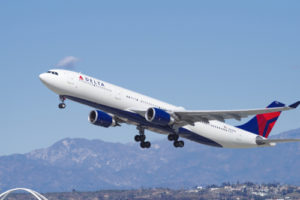Why Warren Buffett Is Smiling Ear to Ear

- The coronavirus crash hit many companies hard, including Berkshire Hathaway.
- Today, Nicholas Vardy discusses Warren Buffett’s investment strategies to capitalize on the recent plunge and set things up for a big year.
The “Corona Crash” is one for the history books.
Over the past month, the U.S. stock market endured one of its sharpest sell-offs in history. Between February 20 and March 23, the S&P 500 sold off more than 30%.
Millions of investors watched helplessly as trillions of dollars in value evaporated from their portfolios.
Yet Warren Buffett, chairman and CEO of Berkshire Hathaway (NYSE: BRK-B) and the greatest investor in history, took the sell-off in stride.
Even as investors were heading for the hills, Buffett was buying his favorite stocks – including 976,000 shares of Delta Air Lines (NYSE: DAL).
Buffett’s mantra has always been “Be fearful when others are greedy and greedy when others are fearful.”
The “Oracle of Omaha” has seen many opportunities in his 89 years, but the coronavirus crash may have offered him one of the best chances to load up on U.S. businesses on the cheap.
Berkshire’s Portfolio Problems
Berkshire Hathaway shares were not immune to the wave of selling.
After hitting a peak of $229.33 on February 17, Berkshire’s share price tumbled a whopping 29.3% to $162.13 on March 23.
The coronavirus crash hit Berkshire’s portfolio of publicly traded stocks particularly hard.
At the end of 2019, Berkshire’s stock market portfolio was $248 billion. By March 23, the value of Berkshire’s share of the top 10 publicly traded holdings was down by as much as $83 billion.
Berkshire’s stakes in Apple (Nasdaq: AAPL), Coca-Cola (NYSE: KO) and Delta fell by an average of 43% between February 20 and midday on March 23.
Berkshire took a $27 billion hit on its Apple stock alone. Delta’s shares fell by an astonishing 63%.
The value of Berkshire’s Bank of America (NYSE: BAC) stock fell by $15 billion.
Why This Matters Less Than You Think
Most investors view Berkshire as a kind of mutual fund – a diversified collection of bets on U.S. stocks.
But Berkshire’s publicly traded holdings are far less important than you might think. In terms of earnings, publicly traded stocks account for a minority of Berkshire’s earnings.
The earnings of Berkshire’s top 10 stock market portfolio positions in 2019 totaled $8.3 billion.
Meanwhile, Berkshire’s earnings from insurance, railroads, utilities and other businesses were far greater, tallying $23.3 billion in 2019.
Put another way… Of Berkshire’s total earnings of about $31.6 billion, over 75% comes from companies not listed on the stock market!
Why Buffett Is Smiling Ear to Ear
Much of the investing world is reeling from the shock of the coronavirus-induced sell-off. Yet I’m betting Buffett is thanking his lucky stars.
Over the past 10 years, the financial peanut gallery has criticized Berkshire for hoarding too much cash.
At the close of 2019, Berkshire had $128 billion in cash on its balance sheet.
During the bull market, this acted as a drag on its returns. As of the close of 2019, Buffett had underperformed the S&P 500 over the past 15 years.
Still, Buffett was reluctant to put this cash to work. After all, Buffett’s favorite indicator had been flashing red.
Buffett describes that indicator – the ratio of total market capitalization to gross domestic product – as “probably the best single measure of where valuations stand at any given moment.”
And it closed 2019 at an all-time high of 152%. The market was just too expensive.
(Even after the recent plunge, it still stands at a high 117%.)
Today, Berkshire’s cash hoarding looks prescient.
How Buffett Is Investing Berkshire’s Cash
Buffett can put his cash to work in three major ways.
First, Berkshire can buy back its stock. The company has indicated it is willing to spend $100 billion for that purpose, but only when the price is below its “intrinsic value.”
In the final three months of 2019, Berkshire repurchased $2.2 billion worth of its stock. That was at a price-to-book ratio of roughly 1.3.
On March 23, Berkshire’s price-to-book value dropped below 1 to 0.92. And today it stands at 1.04.
Berkshire was happy to buy back shares months ago when the price was much higher. Buffett must be even more pleased to do so today.
Second, Berkshire’s top 10 publicly traded holdings are trading at about 40% off their peaks.
Berkshire’s holding time for stocks is “forever.” So Buffett is happy to buy additional stock at a lower price, as he did with Delta.
Third, the coronavirus crash offers Berkshire the option to act as a “dealmaker of last resort.”
A big cash pile allowed Berkshire to cut sweetheart deals with the likes of Goldman Sachs (NYSE: GS) and Bank of America after the global financial crisis of 2008.
The recent drop may result in similar opportunities for Buffett.
Why Berkshire May Be the Ideal Investment
There is no such thing as a no-risk investment.
But if there is one company that can weather anything, it’s Berkshire Hathaway. Berkshire is a diversified financial fortress with a very wide moat. Berkshire will never go bankrupt.
Over the past 50 years, Berkshire has fallen between 40% and 60% four times. And it has rebounded without fail. In the two years after the dot-com bubble burst, Berkshire soared 77%, while the Nasdaq tumbled 62%.
Here’s my prediction: Once markets settle, Berkshire will have a monster year.
Make sure you are along for the ride.
Good investing,
Nicholas
Stay informed with the latest news from Nicholas, including video updates where he shares his views on the current state of the markets. Simply like his Facebook page and follow @NickVardy on Twitter.






